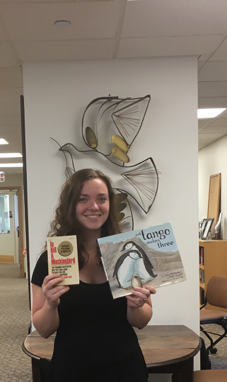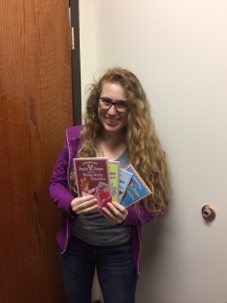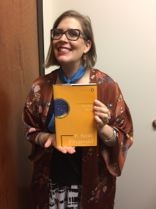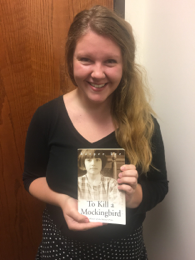This year Banned Books Week took place September 24th through the 30th. The Outreach Team participated by celebrating free speech, literature, and ending censorship with Banned Books Week! “Banned books” are books that schools and parents have challenged and removed from libraries because they disagree with the themes or content presented in the book. Banned Books Week promotes the importance of reading these books despite the pushback they receive and controversy around them. We’re continuing the celebration by sharing some of our favorite banned books with you!
Katie: To Kill a Mockingbird & And Tango Makes Three
Katie loves To Kill a Mockingbird by Harper Lee because of the way it treats a child’s point of view. “It gives credit to a child’s perspective,” she says. “Often people do not think children have the capacity to critically think about complex issues, but Scout does comprehend much of the conflict.”
She also mentions And Tango Makes Three, a children’s book about a family of penguins with same-sex parents. While some schools and libraries have criticized this book for promoting homosexual relationships, a lot of us here appreciate this book because it promotes love and acceptance! “I think that children’s literature shares some of the purest insights to life and love,” says Katie.
Savy: The Junie B. Jones Series
I was shocked when I learned that the Junie B. Jones series was considered a banned book at some schools! This series inspired my love of reading when I first discovered it in third grade. Since then, I continued to collect and read all the new books as they came out. I remember being a sixteen-year-old high school sophomore, barely able to contain my excitement that a new Junie B. Jones book had been released. I continued to buy new books until the series ended with author Barbara Park’s death in 2012 (I was 19 years old that year).
Apparently, some people ban or challenge Junie B. Jones books because they promote the use of bad grammar and incorrect English. In my youth, I was known as the Grammar Police, and even I never had a problem with this—she was a five-year-old, speaking like a five-year-old realistically would. Reading doesn’t have to be exclusively for educational purposes, or promoting one way of understanding “excellence” in the English language—it’s supposed to be fun!
 Jen: The Great Gatsby
Jen: The Great Gatsby
Jen is sharing a book that she’s loved for decades: The Great Gatsby, by F. Scott Fitzgerald. “I love how this book has caused me to think about nostalgia and the past, and I also love the beautiful prose,” she says. Even though Jen likes to celebrate a lot of books during Banned Books Week, she’s choosing The Great Gatsby because F. Scott Fitzgerald’s birthday was this past Sunday!
Kaitlyn: The Perks of Being a Wallflower & To Kill a Mockingbird
Growing up, Kaitlyn loved reading Stephen Chbosky’s The Perks of Being a Wallflower because of how much teenagers can understand and relate to the emotions in the book. “Whether it is about growing up, fitting in, or meeting new people and falling in love with them, Stephen Chbosky has a very special way of explaining feelings that almost every teenager is able to relate to at some point throughout their youth,” she says.
Like Katie, Kaitlyn also loves how Harper Lee’s To Kill a Mockingbird tackles difficult issues through a child’s perspective. “I think it is fascinating to see how Scout navigates and understands the adversities that are presented within her world as she watches them unfold,” she says. “The book covers many issues that are still pressing, even almost 60 years after its release.”
Rebecca: Go Ask Alice
Go Ask Alice is often banned because it deals with teenage drug use, and parents may worry that this book might get their kids interested in drugs—even though the book portrays the negative effects of drug use. “I became torn between feelings of pity, sympathy, and compassion for the protagonist, Alice, and was eager to find out if she could come out of her unfortunate ways,” says Rebecca.
This book is often marketed as one teenager’s actual journal, but that’s not exactly what it is, and that took Rebecca by surprise. “Finding out, after I had read the entire book, that this was actually an amalgamation of ‘patient stories’ from the child psychologist/author’s experiences kind of angered me,” she says. “But I still thought the story and its timeless impact surpassed the frustration I had of being ‘lied’ to that this was a legitimate accounting of a teenager’s life experience.”
What banned books are you reading? Leave us a comment and let us know! Or, tweet at us and the library @DePaulUCWbL and @dpulibrary with a picture of your favorite banned book!
Discover more from UCWbLing
Subscribe to get the latest posts sent to your email.

